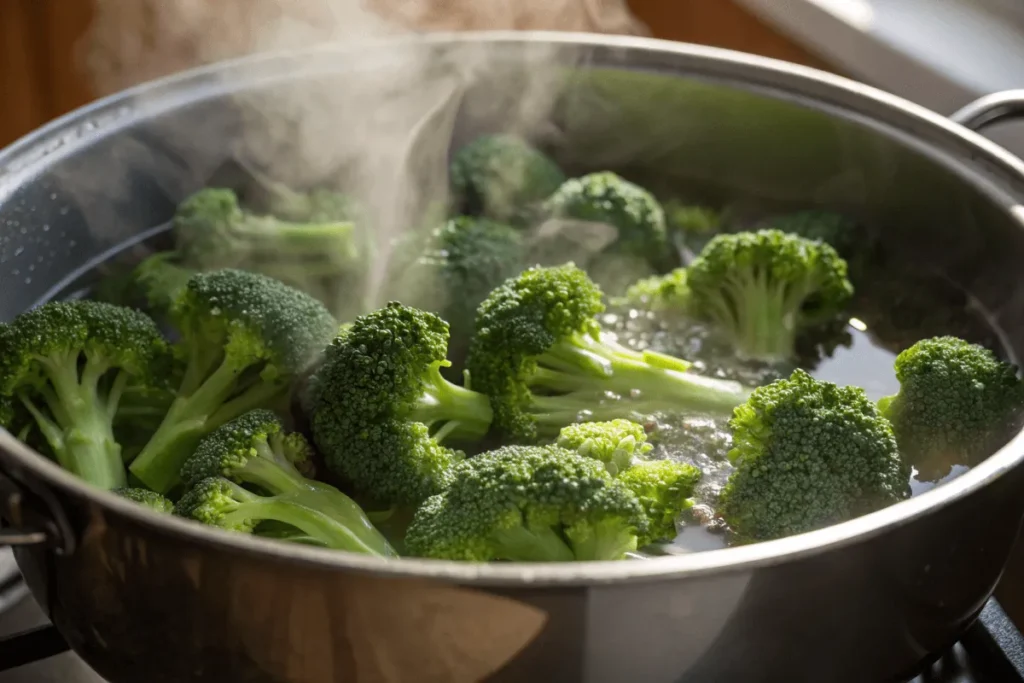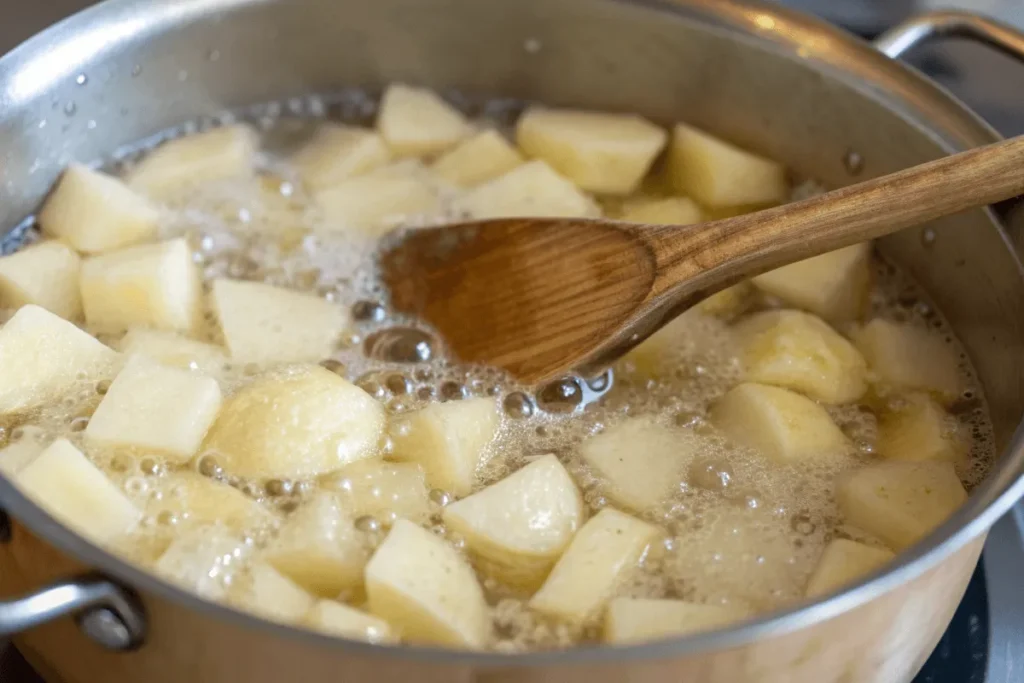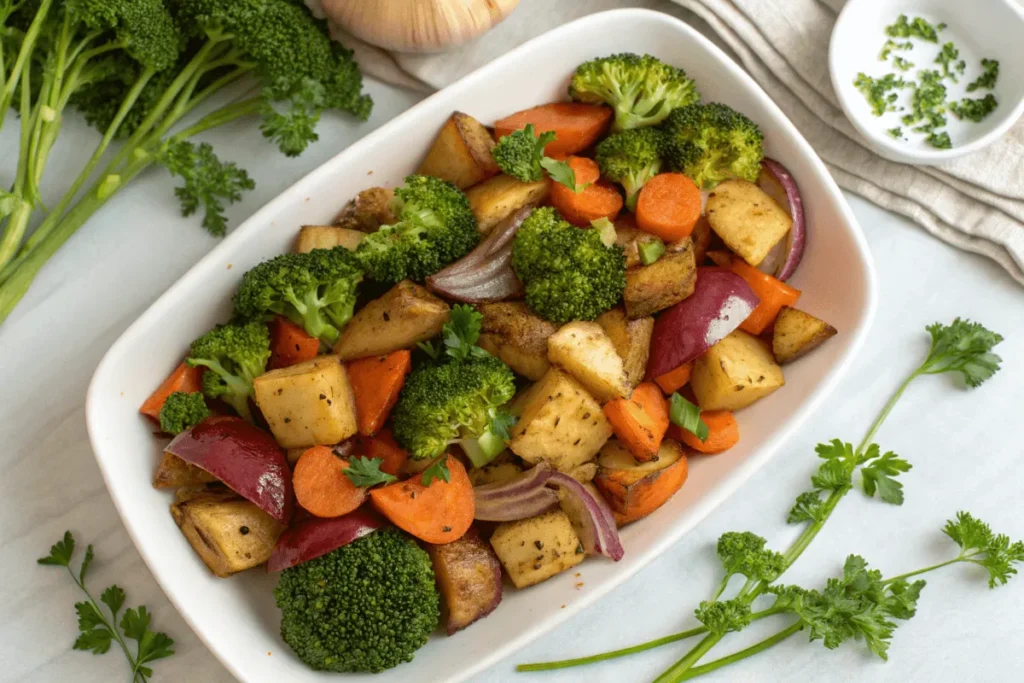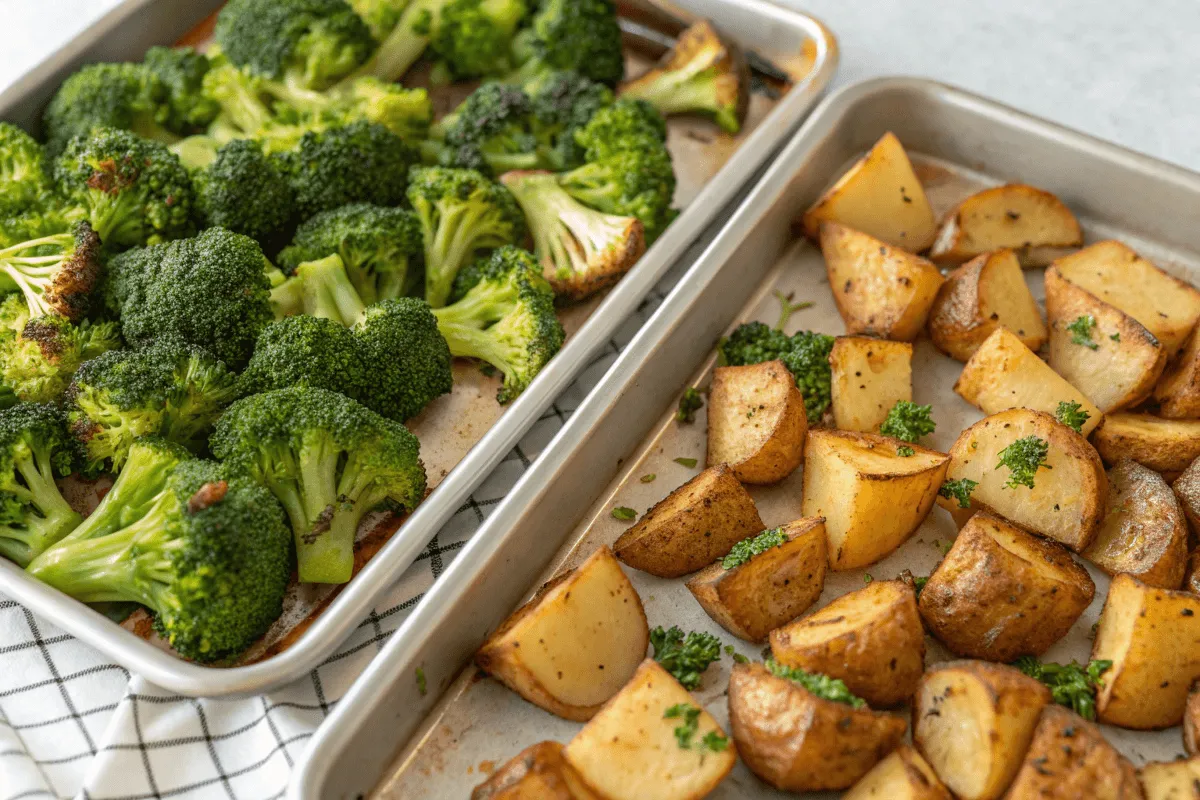Does Broccoli Cook Faster Than Potatoes?
Cooking vegetables might seem straightforward, but when you’re dealing with different types—like broccoli and potatoes—timing can get tricky. Does broccoli cook faster than potatoes? In most cases, the answer is yes, but the details depend on the method, size of the cut, and even the type of dish you’re preparing.
In this article, we’ll dive into why broccoli typically cooks faster than potatoes, explore the best cooking techniques for each, and discuss how factors like size, water content, and cooking temperatures come into play. Whether you’re roasting, steaming, or boiling, understanding these differences will help you achieve perfectly cooked meals every time.
Understanding Cooking Times for Broccoli and Potatoes
The Fundamental Differences in Cooking Times
The main reason broccoli cooks faster than potatoes lies in its structure. Broccoli is less dense and contains more water compared to starchy potatoes. Its florets are thin and delicate, which allows heat to penetrate quickly. In contrast, potatoes are dense and starchy, requiring more time to soften and cook through.
For instance, steaming broccoli takes only 5–7 minutes, while potatoes may need 15–20 minutes to become tender when boiled. These differences are key to timing your cooking, especially if you’re preparing them together.
Nutritional Factors That Affect Cooking Speed
Broccoli’s high water content not only speeds up cooking but also affects how nutrients are retained. Quick cooking methods like steaming or blanching help preserve its vitamins, while overcooking can lead to nutrient loss. On the other hand, potatoes take longer due to their dense structure and higher starch content, which breaks down gradually during cooking.
How Broccoli and Potatoes Respond to Heat
Broccoli’s florets and stalks absorb heat differently. The thin, airy florets cook almost instantly, while the thicker stalks need slightly more time. Potatoes, however, require even heat distribution to soften their dense interiors. This is why they’re often cut into smaller pieces before cooking—smaller sizes mean faster cooking!
Best Cooking Methods for Broccoli and Potatoes
Quick Techniques for Cooking Broccoli
When time is of the essence, broccoli can be a breeze to cook. Steaming is one of the fastest methods, taking just 5–7 minutes for tender, nutrient-packed florets. To steam, place your broccoli in a basket over boiling water, cover, and let the magic happen. You’ll preserve more nutrients and achieve a vibrant green color.

For even quicker results, microwaving is a great option. Add broccoli to a microwave-safe bowl with a splash of water, cover with a plate, and cook for 3–4 minutes. The microwave locks in both moisture and nutrients, making it a top pick for busy cooks.
Best Methods for Cooking Potatoes Efficiently
Potatoes, on the other hand, take more time. Boiling is a classic method, but cutting potatoes into smaller chunks can reduce the cooking time to around 15 minutes. Roasting is another popular choice, with cubed potatoes taking about 30 minutes at 400°F.
Pressure cookers and air fryers are modern lifesavers for speeding up the process. A pressure cooker can cook whole potatoes in as little as 10 minutes, while an air fryer crisps them up beautifully in about 20 minutes.
Can Broccoli and Potatoes Be Cooked Together?
Does broccoli cook faster than potatoes? Absolutely, but that doesn’t mean they can’t be cooked together. To balance their cooking times, start by partially cooking the potatoes. Then, add broccoli during the final 5–10 minutes of cooking. This approach ensures both are perfectly done without overcooking the broccoli.
Factors That Influence Cooking Times
Size and Cut: Why It Matters
When preparing vegetables, size matters. Small potato cubes cook faster than whole potatoes, while broccoli florets cook quicker than their thicker stalks. Cutting everything into similar sizes ensures even cooking, especially if you’re combining the two.
The Role of Water Content in Broccoli and Potatoes
Broccoli’s high water content helps it cook quickly, especially with steaming or microwaving. Potatoes, being dense and starchy, require more heat to penetrate their core, slowing down the cooking process. Understanding this difference can help you choose the best methods to cook both vegetables efficiently.
Cooking Temperatures and Timing Adjustments
Cooking times vary depending on the temperature and technique. High heat methods like roasting speed up cooking but require close attention to avoid burning. Steaming and boiling, while slower, offer more consistent results. Adjust your timing based on the method and the dish you’re preparing to ensure perfectly cooked vegetables every time.

Comparing Nutritional Retention During Cooking
Does Broccoli Lose Nutrients Faster Than Potatoes?
Broccoli is known for its rich nutrient profile, but its delicate structure makes it more susceptible to nutrient loss during cooking. Techniques like boiling can leach vitamins such as vitamin C into the water, especially when overcooked. On the other hand, potatoes are denser and retain most of their nutrients, such as potassium and vitamin C, even with longer cooking times.
If you’re wondering, Does broccoli cook faster than potatoes? the answer is yes, but faster cooking methods like steaming or microwaving broccoli also help preserve its nutritional value. Meanwhile, potatoes benefit from baking or roasting, which keeps their vitamins intact without adding extra moisture.
How Cooking Methods Affect Health Benefits
Cooking techniques significantly impact the health benefits of both broccoli and potatoes. Broccoli retains its vibrant green color and crisp texture when steamed or stir-fried, making these methods ideal for preserving antioxidants. Potatoes, when baked or roasted with minimal oil, provide a fiber-rich, low-fat side dish.
To get the most out of both, avoid overcooking or adding excessive butter or cream, which can diminish their health benefits. Combining the right cooking techniques ensures you’ll enjoy flavorful and nutritious meals every time.
Creative Recipes for Broccoli and Potatoes
Roasted Broccoli and Potato Medley
If you’re wondering, “Does broccoli cook faster than potatoes?”, the answer can help you craft a delicious roasted vegetable dish. Start by cutting potatoes into small cubes and tossing them with olive oil, garlic, and your favorite seasonings. Roast the potatoes at 400°F for about 20 minutes, then add broccoli florets to the tray for the last 10 minutes.
This timing ensures the potatoes are golden and soft while the broccoli remains crisp-tender. The result is a flavorful medley that pairs well with grilled chicken or as a standalone vegetarian meal.

Broccoli and Potato Cheese Soup
For a cozy, comforting recipe, broccoli and potato cheese soup is a winner. Since potatoes take longer to soften, start by boiling diced potatoes in chicken or vegetable broth. Once tender, add chopped broccoli florets during the final 5 minutes of cooking.
Blend part of the soup for a creamy texture, leaving chunks for a hearty feel. Stir in shredded cheddar cheese and a splash of cream for richness. This recipe beautifully balances the faster cooking time of broccoli with the heartiness of potatoes.
Troubleshooting Common Cooking Issues
Why Are My Potatoes Undercooked but My Broccoli Overcooked?
This is a common problem when preparing both vegetables together. Since broccoli cooks faster than potatoes, start by cooking the potatoes first, either through boiling or roasting. Add broccoli later to avoid overcooking it. Timing adjustments ensure both vegetables are perfectly done.
How Can I Prevent Broccoli from Becoming Mushy?
Overcooking is the biggest culprit behind mushy broccoli. If you’re combining it with potatoes, consider steaming or stir-frying the broccoli separately and adding it to the dish just before serving. Cooking it for less time preserves its texture and nutrients.
Can I Cook Broccoli and Potatoes in the Same Pan?
Yes, but you need to plan for their different cooking times. For example, if roasting, give potatoes a 15–20 minute head start before adding broccoli to the same pan. This method ensures both vegetables cook evenly without one becoming overcooked.
Wrapping Up: Does Broccoli Cook Faster Than Potatoes?
Why Broccoli Cooks Faster Than Potatoes
If you’ve ever asked, “Does broccoli cook faster than potatoes?” the answer lies in their physical and structural differences. Broccoli’s high water content and delicate florets allow it to absorb heat quickly, making it ideal for fast-cooking methods like steaming or stir-frying. Potatoes, on the other hand, are dense and starchy, which slows down the cooking process.
This difference means that broccoli and potatoes require separate cooking strategies to achieve optimal texture and flavor. Broccoli needs minimal cooking to stay tender-crisp, while potatoes benefit from longer methods like boiling or roasting to soften their starchy interiors.
Balancing Cooking Times for Perfect Dishes
Cooking broccoli and potatoes together can be challenging, but it’s doable with a little planning. Start by cooking potatoes first, either by boiling or roasting, and add broccoli in the final few minutes. This ensures the potatoes are soft while the broccoli retains its bright color and texture. Using techniques like steaming or pressure cooking can also help balance their cooking times.
Understanding these nuances will help you confidently combine these two vegetables in your recipes.
FAQs About Cooking Broccoli and Potatoes
Which Vegetables Cook the Fastest?
Vegetables like spinach, zucchini, and broccoli cook much faster than root vegetables like carrots and potatoes due to their lower density and higher water content. For example, broccoli can be steamed in just 5–7 minutes, while potatoes often require at least 15–20 minutes to soften.
How Long Does Broccoli Need to Be Cooked?
Broccoli typically needs only a few minutes to cook, depending on the method. Steaming takes 5–7 minutes, while stir-frying requires even less time. Overcooking can make broccoli mushy and cause it to lose its nutrients, so watch closely as it cooks.
Which Way Is Faster to Cook a Potato?
Boiling diced potatoes is one of the quickest methods, taking about 15 minutes. For a crispy texture, air frying or roasting works well but takes longer—around 20–30 minutes. Pressure cookers are the fastest option, cooking whole potatoes in just 10 minutes.
Does Broccoli Get Softer the Longer You Cook It?
Yes, broccoli softens the longer it cooks, but overcooking can make it mushy and unappetizing. For the perfect texture, cook until just tender-crisp.
For more recipe inspiration, check out the detailed guide on Top Fast Recipes, where you’ll find tips for cooking broccoli and potatoes together.
Final Thoughts on Cooking Broccoli and Potatoes
Using Proper Techniques for Better Results
The key to cooking broccoli and potatoes successfully is knowing their differences. If you’re preparing a dish like roasted vegetables, cut the potatoes into smaller pieces or parboil them to reduce their cooking time. Then, add broccoli near the end to avoid overcooking it.
For dishes like casseroles or soups, layering ingredients based on their cooking times ensures everything cooks evenly. This approach eliminates any frustration over timing and guarantees a dish that’s both flavorful and visually appealing.
Explore More Cooking Tips and Recipes
Still curious about how to cook broccoli and potatoes perfectly? For more inspiration, check out related recipes at Top Fast Recipes, where you’ll find expert tips and creative ideas for incorporating these vegetables into your meals. Whether you’re roasting, steaming, or boiling, these techniques will make your dishes a success!

